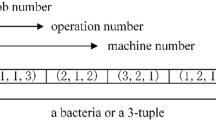Most of the available industrial schedulers are based on a simulation approach using dispatching rules. These rules are often dedicated to the satisfaction of a single performance criterion, and are used whatever the characteristics of the workshop or of the set of jobs. An approach which allows one to bring in compromises between rules is set out in this paper. These compromises can be parametered in accordance with the objectives of the workshop and the characteristics of the jobs in order to introduce some reactivity in the decision system. Three ways to set up the parameters are compared: experimental design, fuzzy expert system and neural network. The method allowing one to define compromises can be implemented on each scheduler that uses a simulation approach. Tests have been made with an industrial scheduler called SIPAPLUS, the results of which are developed in this paper.
Similar content being viewed by others
References
Bel, G., Bensana, E. and Dubois, D. (1988) Construction d'ordonnancements prévisionnels: un compromis entre approches classiques et systèmes experts. APII, 22, 509–536.
Boucon, D. (1991) Ordonnancement d'atelier: aide au choix de règles de priorité, Thèse ENSAE, Toulouse.
Cavaillé, J. B. and Proth, J. M. (1987) Pratique de la Simulation en Production Discontinue, Collection Novotique, Edition Colloques & Conseils.
Dubois, D. and Prade, H. (1988) Possibility Theory, an Approach to Computerized Processing of Uncertainty, Plenum Press, New York.
Dubois, D., Prade, H. and Testemale, C. (1988) Weighted fuzzy pattern matching. Fuzzy Sets and Systems, 28, 1–17.
Erschler, J., Roubellat, F. and Vernhes, J. P. (1976) Finding some essential characteristics of the feasible solutions for a scheduling problem. Operations Research, 24(4). 774–784.
Grabot, B. and Geneste, L. (1994) Dispatching rules in scheduling: a fuzzy approach. The International Journal of Production Research 32(4), 903–915.
Grabot, B., Geneste, L. and Dupeux, A. (1993) Tuning of scheduling parameters for workshop intelligent reactivity, in 8th IEEE International Symposium on Intelligent Control, August 25–27, Chicago.
Hertz, J., Krogh, A. and Palmer, R. (1991) Introduction to the Theory of Neural Computation, Addison-Wesley, Reading, MA.
MacCarthy, B. L. and Liu, J. (1993) Addressing the gap in scheduling research: a review of optimization and heuristic methods in production scheduling. The International Journal of Production Research, 31(1), 59–79.
Mizumoto, M. (1989) Improvement methods of fuzzy controls, in Proceedings of the 3rd IFSA Congress, 6–11 August, Seattle, USA, (J. C. Bezdek, ed) pp. 60–62.
Montazeri, M. and van Wassenhove, L. N. (1990) Analysis of scheduling rules for a FMS. The International Journal of Production Research, 28(4), 785–802.
Smith, S. (1992) Knowledge-base production management: approaches, results and prospectives. Production Planning and Control, 3(4), 350–380.
Tagushi, G. (1987) System of Experimental Design, Unipub/Kraus International Publication NY.
Author information
Authors and Affiliations
Rights and permissions
About this article
Cite this article
Grabot, B., Geneste, L. & Dupeux, A. Multi-heuristic scheduling: three approaches to tune compromises. J Intell Manuf 5, 303–313 (1994). https://doi.org/10.1007/BF00127648
Issue Date:
DOI: https://doi.org/10.1007/BF00127648




